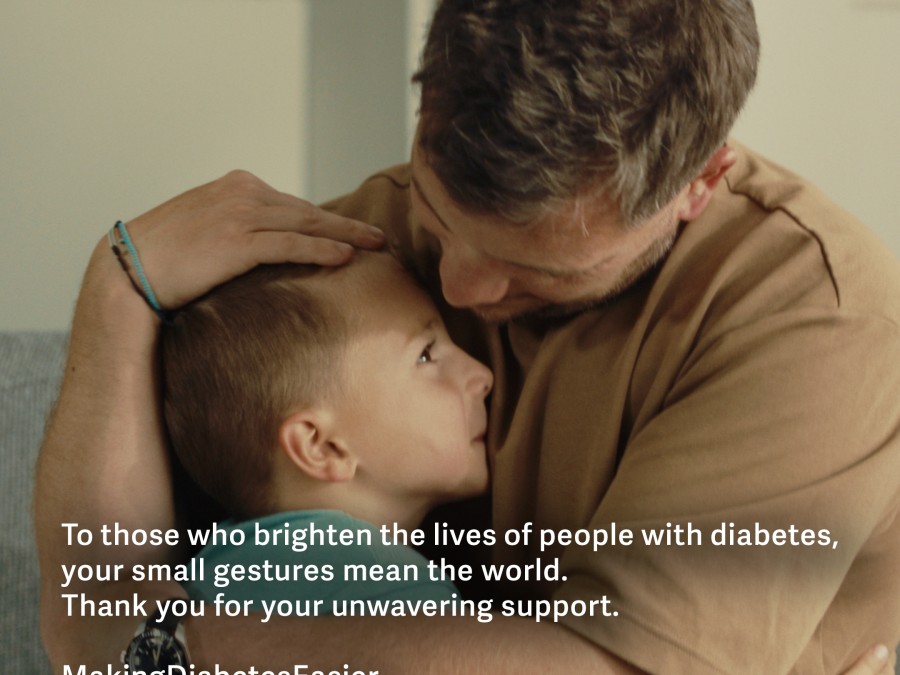The importance of mental health for people with diabetes

Living with diabetes goes far beyond the physical aspect. It's not just a matter of managing glucose levels or following a diet, it's also all about learning to cope with everyday situations. It's a path that requires some inner strength, understanding and support.
Because every action, whether it's measuring, planning or adjusting, may also have its own emotional cost in terms of anxiety, fear, exhaustion and frustration. And if you don't acknowledge and respect these feelings, you can make caring for yourself much more difficult.
What's more, people living with diabetes often feel that they always have to look strong and capable to the people around them, and that can make them hide their feelings and accumulate emotional tension.
Diabetes burnout
At some point in their lives, many people with diabetes can go through something called diabetes burnout. It's a kind of deep exhaustion you can feel after so much time spent on managing a constant self-care routine. It's not that you're lazy or short on willpower; it's an inevitable outcome of having to do the right thing, every single day1.
All this emotional wear and tear can take the form of lost motivation, sadness, feelings of failure… you may even want to “take a break” from glucose management. But sometimes people with diabetes don't discuss these feelings with their doctor, when in fact facing up to this issue is really important for your physical and emotional health.
Diabetes burnout can also affect your personal relationships and lead to misunderstandings with family and friends, who don't fully understand the constant effort involved in living with diabetes.
It can impact your work or academic output due to difficulties in concentrating or lack of energy.
Stress and glucose: a direct link
When you go through moments of stress or anxiety, your body releases hormones like cortisol, which raise the levels of glucose in the bloodstream. It's a natural physical reaction, but it can make life more complicated.
When you feel like this, you may also give up healthy habits or acquire unhealthy ones: emotional eating, poor sleep patterns, putting off exercise or forgetting to take medication. All this can gradually affect your mind-body balance3.
Long-term stress can even affect decision making, making it more difficult to follow a doctor's advice and maintain the discipline you need to continue with your treatment.
In situations like these, learning to identify the body's signals when reacting to stress is very important to enable you to take timely action and avoid unnecessary imbalances.
What happens when I don't feel good?
Emotional wellbeing isn't a luxury. It's a basic need for anyone. It's been estimated that about 30 % of people living with type 2 diabetes develop depressive symptoms at some point in their lives4. And when your mood is affected, your adherence to treatment can often suffer too.
This can create a vicious circle that is not easy to break: I feel bad → I care for myself less → My glucose levels rise → I feel worse. That's why caring for your mental health is also a way to protect your body.
Breaking the cycle requires courage and support. Acknowledging that one needs help is the first step towards a better quality of life.
Just talking about how you feel can reduce some of the emotional load. Sharing these feelings with someone you trust or with a medical professional can make all the difference
Tools that can help us
Finding the right emotional pathway is much easier when done with others. There are a range of resources that can make a big difference and help to manage emotions:
Mindfulness and inner connection
Practising full awareness helps to reduce stress and reconnects you to yourself. There are studies that show that even just a few minutes a day may improve emotional wellbeing and support better glucose management4.
Psychological therapy
A space where a professional listens can sometimes be essential. For example, cognitive-behavioural therapy has shown itself to be effective in reducing depressive symptoms and increasing the commitment to self-care1.
Support networks
Talking to other people who live with diabetes via face-to-face groups or online communities can help to feel understood and less lonely. Support from family and close friends can also be a major emotional support.
Take a break
Reading, walking, listening to music, laughing or simply resting. Including short breaks to do things you like helps to recharge energy levels and offers a simple way to care for your emotional welfare3.
The importance of a human approach
Any comprehensive treatment needs to include emotional wellbeing. It's important for health professionals to ask directly how the person feels, listen to them and refer them to a psychologist when necessary2.
Providing workshops, encounter groups and emotional education materials at health centres can help to normalise these issues, breaking down stigmas and offering compassionate support at difficult times.
Living with diabetes isn't just about figures and controls. It's also about how you feel on your journey. When you look after your feelings, it's easier to follow routines, stay motivated, and, above all, live well.
Sources
- American Diabetes Association https://diabetes.org/
- CDC. Diabetes https://www.cdc.gov/diabetes/
- NIDDK. Diabetes https://www.niddk.nih.gov/health-information/diabetes
- International Diabetes Federation. Diabetes impacts the mental health https://idf.org/news/diabetes-hidden-burden/





